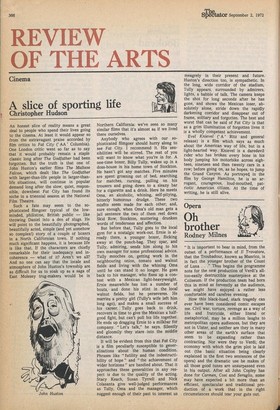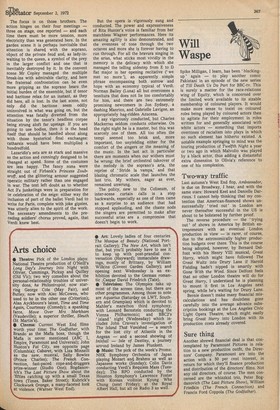Opera
Oh brother
Rodney Milnes
"It is important to bear in mind, from the outset of a performance of 11 Trovatore, that the Troubadour, known as Manrico, is in fact the younger brother of the Count of Luna . . ." Thus begins the programme note for the nesii production of Verdi's alltoo-easily destructible masterpiece at the Coliseum. If the production team had born this in mind as fervently as the audience, we might have enjoyed a rather less comfortable and carefree evening.
How this black-hued, stark tragedy can ever have been considered comic escapes me. Civil war, torture, revenge as a way of life and fratricide, either literal or metaphorical, may be a million laughs to metropolitan opera audiences, but they are not in Ulster, and neither are they in many other areas of the earth's surface that seem to be expanding rather than contracting. Nor were they to Verdi; the economy with which the grim plot is laid out (the basic situation being clearly explained in the first two sentences of the opera) and the dramatic use he makes of all those good tunes are unsurpassed even in his output. After all John Copley has done for Carmen, Cosi and Seraglio, some may have expected a bit more than an efficient, spectacular and traditional production of a work that in the right circumstances should tear your guts out. The focus is on those brothers. The action hinges on their four meetings — three on stage, one reported — and each time there must be more tension, more electricity than was generated here. In the garden scene it is perhaps inevitable that attention is shared with the soprano, object of the private feud and, as lady-inwaiting to the queen, a symbol of the prey in the larger conflict and one that is inevitably destroyed by it. In the convent scene Mr Copley managed the multiple break-ins with admirable clarity, and here the fraternal confrontation can be even more gripping as the soprano bears the initial burden of the ensemble, but if tenor and baritone relax for an instant, as they did here, all is lost. In the last scene, not Only did the baritone seem oddly uninvolved in what was going on, but the attention was fatally diverted from the situation by the tenor's headless corpse being strung aloft far upstage. If you are going to use bodies, then it is the head itself that should be bandied about along With those hysterical final exchanges: catharsis would have been multiplied a hundredfold.
Lazaridis's sets are as stark and massive as the action and cunningly designed to be changed at speed. Some of the costumes are less happy. The fancy nuns were straight out of Firbank's Princess Zoubaroff, and the glittering armour suggested Operatic military rather than one engaged in war. The text left doubt as to whether Act 3's junketings were in preparation for or celebration of the seige: either way the inclusion of part of the ballet Verdi had to write for Paris, complete with joke gipsies, was utterly alien to the spirit of the work. The necessary amendments to the preceding soldiers' chorus proved, again, that Verdi knew best. But the opera is vigorously sung and conducted. The power and expressiveness of Rita Hunter's voice is familiar from her matchless Wagner performances. Here its amazing agility is also demonstrated, and the evenness of tone through the two octaves and more she is forever having to run through. For all the bravura singing in the arias, what sticks most vividly in the memory is the delicacy with which she managed the telling sidestep from E to D flat major in her opening recitative (' we met no more '), an apparently simple phrase encompassing both sorrow and hope with an economy typical of Verdi. Norman Bailey (Luna) all but overcomes a tessitura that does not lie too comfortably for him, and there are two extremely promising newcomers in Jon Sydney, a dashing Manrico, and Gabrielle Lavigne, an appropriately hag-ridden Azucena.
I say vigorously conducted, but Charles Mackerras seldom conducts otherwise. On the right night he is a master, but this was scarcely one of them. All too often the tempi seemed too brisk and, more important, too unyielding either for the comfort of the singers or the meaning of the music. In the last act in particular there are moments when our withers must be wrung: the brief orchestral takeover of the melody in the soprano's aria, the reprise of Stride la vampa,' and that blazing chromatic scale that launches the last trio. My withers, eager as ever, remained unwrung.
The policy, new to the Coliseum, of inter-scene curtain calls is a step backwards, especially as one of them came as a surprise to an audience that had stopped applauding, and the chaste nods the singers are permitted to make after successful arias are a compromise that doesn't begin to work.







































 Previous page
Previous page